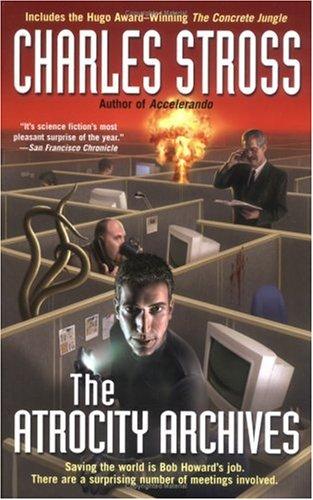Review of 'The Atrocity Archives' on 'Goodreads'
3 stars
This is an odd initiative by Orbit: not a novel, not a collection of short stories but two novellas and an essay by Charles Stross. Looking at the imprint page, I approached the work with some degree of trepidation. This is the pre-Iron Sunrise Stross. If the aforementioned Dan Brown has taught me anything it’s to be very wary of the so called ‘back-catalogue’.
Bob Howard is the IT go-to guy in the Laundry, an organisation where you have to sign the Official Secrets Act before you can even know of its existence. Like most of the employees, Bob was press-ganged into service when his studentish dabblings with polynomial theory threatened to unleash enough dark energy to flatten Leeds. After months of boredom, his request for active duty is accepted and he finds himself in the type of situation that switches from uncomfortable tedium to underpant-staining terror in the firing of a synapse. The back story to the Laundry neatly marries real-life WWII events such as Bletchley Park’s code breaking efforts, Alan Turing’s work and SOE operations in Europe with a secret battle to stop squamous things From Beyond invading our realm and possessing and/ or eating us. In ‘The Atrocity Archive’ Bob is drawn deeper into the Laundry’s machinations as he goes up against a plot to assert pan-dimensional Nazi supremacy. In ‘The Concrete Jungle’, the use of Gorgonism as a national security tool goes horribly wrong.
The mix of Lovecraftian themes, dimension-hopping Nazis, bureaucratically hidebound yet super-secret government departments and high-tech computer geekdom married with unspeakable eldritch powers is an infectious one. And the ‘truth’ behind the Jewish holocaust in ‘The Atrocity Archive’ is both gruesome and effectively realised. The jokes are so-so and some of the situations predictable, most notably Bob’s ongoing rubber-stamp battle with sometime supervisor Harriet. Stross is still flexing his writerly muscles here looking for a more definitive voice. The essay at the end makes some interesting points about the nature of horror, but seems by inference to accord more weight to the stories in The Atrocity Archives than they really deserve. They’re just not that profound. What they are however is a fast-paced romp, and an enjoyable one at that. The Atrocity Archives is followed by another Bob Howard book, The Jennifer Morgue.

